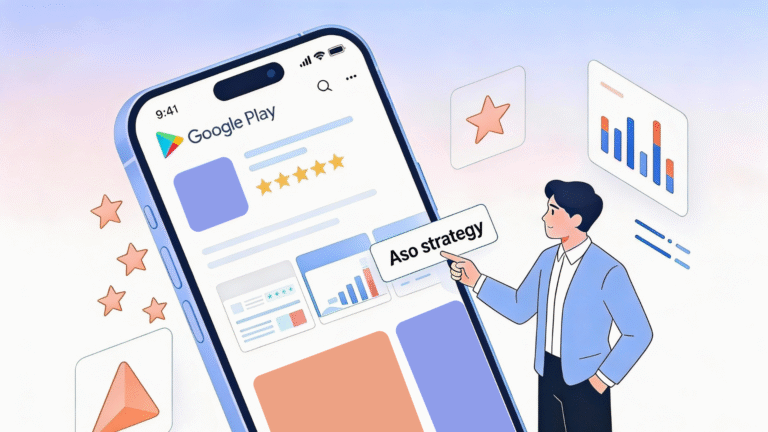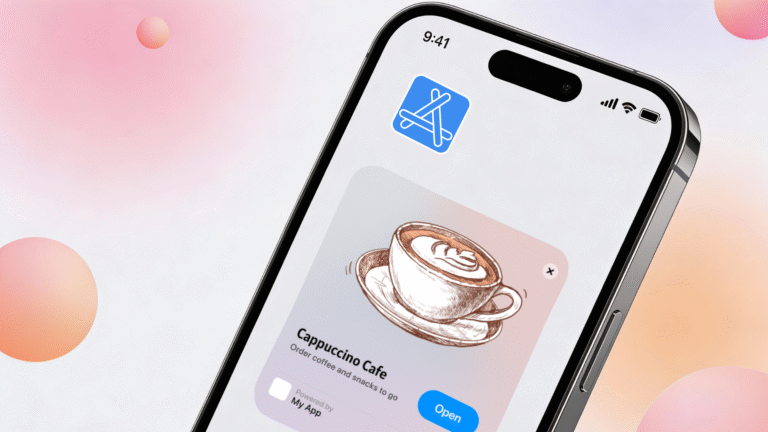‘Failure doesn’t mean the game is over, it means try again with experience’. These words by Leonard Schlesinger, an American author, educator, and business leader, resonate deeply in the world of mobile game marketing, where success is often a result of relentless determination, adaptation, and learning from past mistakes.
As we get ready to blast off into 2025, the mobile gaming arena pulsates with lively enthusiasm, drawing in millions of players from around the world. As a matter of fact, according to recent reports, revenue in the mobile games market will reach US$126.10bn in 2025. In the midst of this intensely competitive industry scenario, mobile gaming companies are driven to develop the most successful marketing strategies, understanding that there is no universal solution.
With all that said, the art of promoting mobile games has now become a complex symphony of strategy, innovation, and technology. To master this art, you need knowledge. We’re committed to providing exactly that. And stimulating you to gain as much experience as you can to transform this knowledge into a refined mobile game marketing strategy plan that will skyrocket your revenue to stardom.
Upon finishing exploring our ASO blog post, you will:
- find out what exactly mobile game marketing is;
- explore 10 major reasons why promoting your mobile game is so important;
- delve deep into the difference between paid and organic mobile marketing practices;
- learn what a mobile game marketing plan is and how to create it;
- find out about modern trends in the mobile gaming scene;
- study mobile game marketing trends of 2025;
- get to grips with some of the most effective mobile game promotion techniques and channels;
- learn how to make informed decisions when promoting your mobile game;
- equip yourself with the knowledge needed to thoughtfully pick the best mobile game marketing practices based on the trends and nuances within your specific gaming niche.
Table of Contents
What Is Mobile Game Marketing?
Mobile game app marketing involves a spectrum of strategies and tactics geared towards the promotion and advertisement of mobile games to their specific target groups. Its primary aim is to bolster the number of downloads, drive revenue, and nurture player retention.
Marketing a mobile game is an ongoing process, requiring continuous and steadfast commitment. It involves working up a marketing strategy, devising an action plan, and pioneering fresh methods to spread the word. Additionally, it focuses on interacting with your current customer base and community. The aim is not solely to create awareness about your mobile game but also to increase user engagement and participation. Now, let’s delve deeper into the importance of mobile game marketing.
10 Reasons Why Mobile Game Marketing Is So Important
Promoting your mobile game holds significant importance for several key reasons. We’ll list those reasons below.
- It captivates player’s attention
Mobile game influencer marketing is paramount because it allows you to capture the ever-shifting attention of a vast and diverse player base. With countless gaming options available, marketing ensures your game stands out in a crowded app store. - It boosts revenue
Effective mobile game marketing strategies boost downloads and in-game purchases, driving revenue for your mobile game. It’s not just about creating a brilliant game. It’s about monetizing it effectively. - It contributes to player retention
Marketing isn’t just about acquiring new players. It’s also about keeping existing ones engaged. Frequent updates and engaging campaigns help retain players over time. - It helps you build a community
Marketing creates a community of loyal players who advocate for your game. This word-of-mouth promotion is invaluable for long-term success. - It grants you a competitive advantage
In a fiercely competitive market, a successful mobile game marketing campaign gives you the edge by showcasing your game’s unique features and benefits. - It stimulates improvement through feedback
Effective mobile game marketing campaigns generate valuable player feedback, helping you identify areas for improvement and enhance the gaming experience. - It contributes to your continued relevance
Regular marketing efforts keep your game relevant in an industry where key trends and player preferences evolve rapidly. - It helps you make informed decisions
Quality mobile game promotion allows you to gather crucial data on player behavior in general and their spending habits in particular, enabling informed decisions for game enhancements and updates. - It creates a solid foundation for diverse monetization possibilities
Marketing helps you effectively implement various mobile game monetization models, such as in-app ads, microtransactions, or subscription services. - It stimulates user acquisition
On-point promotional strategies drive user acquisition, expanding your player base and increasing your mobile game’s visibility.
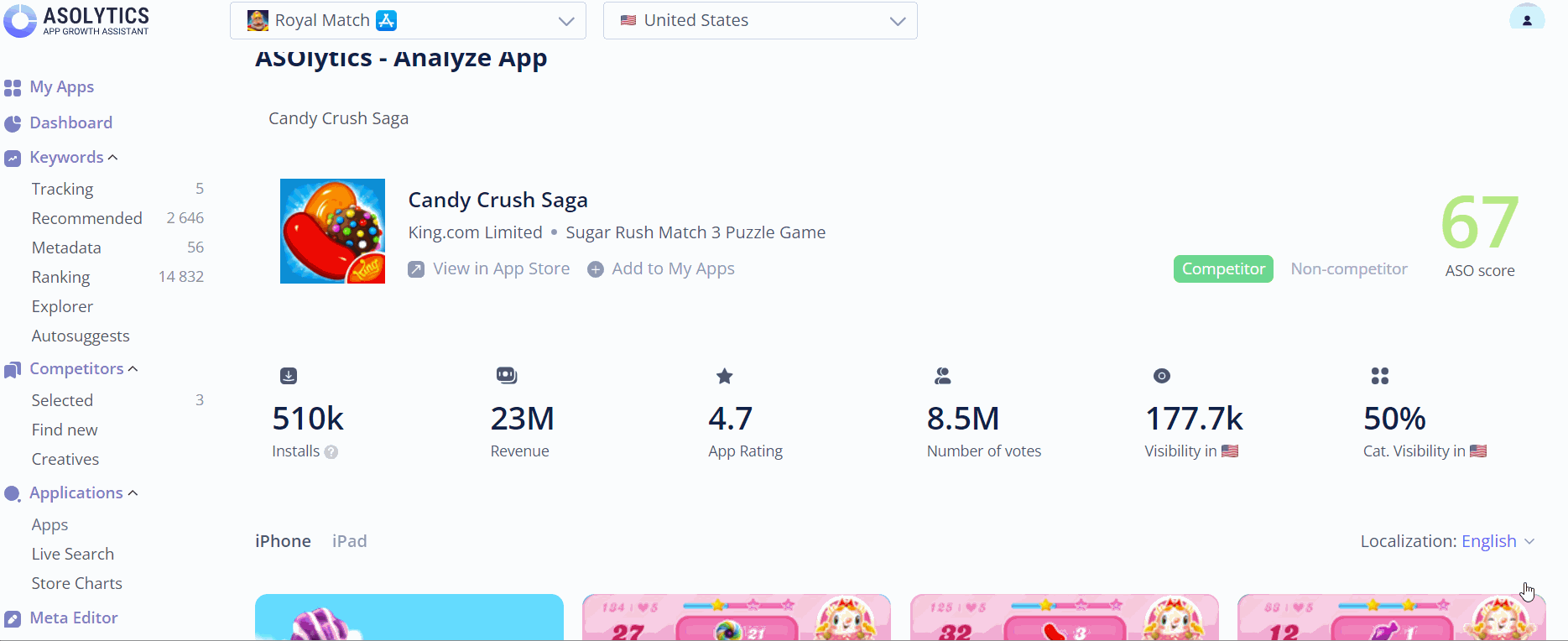
Last but not least, successful mobile game marketing can enhance your brand’s reputation, positioning your company as a reliable and innovative game developer. As an added bonus, through resultative mobile game promotion, you can tap into a global audience, transcending geographical boundaries and cultural barriers.
Paid vs. Organic Mobile Game Marketing
Paid and organic mobile game marketing are two distinct strategies for promoting your game. Each approach comes with its own benefits and factors to think about.
When it comes to paid mobile game marketing, the hottest practices as of today are:
- In-App Advertising. Did you know that over 70% of mobile gamers don’t mind seeing ads in gameplay at all? Surprising but true! That said, don’t hesitate to promote your game within other popular mobile apps, making the most of their user base to reach potential players.
- Social Media Advertising. Run targeted ads on platforms like Facebook, Instagram, and Twitter to engage with specific demographics
- Playable Ads. Offer interactive previews of your game within ads, allowing users to experience gameplay before downloading.
- Video Ads. Create engaging video content for platforms like YouTube and TikTok to showcase your game’s features.
- App Store Advertising. Invest in paid placements within app stores to boost visibility on search results and app recommendations.
- Affiliate Marketing. Partner with influencers or affiliate networks to promote your game to their dedicated audiences.
- Retargeting Campaigns. Re-engage users who have shown interest in your game but haven’t yet installed it.
- Cross-Promotion Networks. Collaborate with other game developers to promote each other’s games to a shared audience.
- Interstitial Ads. Display full-screen ads at natural breaks in gameplay or app navigation.
- Google Universal App Campaigns. Utilize Google’s UAC to streamline the promotion of your app across Google properties.
- Programmatic Advertising. Use automated ad buying to target specific audiences and optimize ad placements.
- Geolocation Targeting. Target users based on their physical location to promote your game effectively.
- Email Marketing. Promote your mobile gaming app through paid email campaigns, reaching users who have opted to receive game-related content.
As for popular organic mobile game promotion strategies, they include:
- App Store Optimization (ASO). Optimize your app’s title, keywords, description, and visuals to improve visibility in app store search results.
- Quality Gameplay. Develop a high-quality game with engaging mechanics, graphics, and content to attract and retain players.
- User Reviews and Ratings. Encourage satisfied players to leave positive reviews and ratings in app stores to enhance your game’s reputation.
- Regular Updates. Continuously improve your mobile gaming app by adding new features, levels, and content to keep players engaged.
- Community Building. Create and nurture a community around your game through social media, forums, and in-game communication.
- Content Marketing. Share valuable content related to your game, such as blogs, videos, or tutorials, to attract and engage players.
- User-Generated Content. Encourage players to share their gameplay experiences, fan art, and videos on social media.
- Referral Programs. Implement referral systems that reward players for inviting friends to play your game.
- Press Coverage. Reach out to gaming journalists and bloggers for potential reviews and articles about your game.
- Cross-Promotion. Collaborate with other game developers to promote each other’s games to a shared audience.
- Email Marketing. Build an email list of interested players and send them updates and promotions.
- Localized Marketing. Tailor your marketing efforts to specific regions and languages to reach a broader audience.
- Engagement Events. Host in-game events, challenges, or contests to keep players active and engaged.
- Word of Mouth. Foster positive word-of-mouth marketing by delivering a great gaming experience that players want to share with friends.
Below, we’ll provide a breakdown of the key differences and factors to consider when choosing between paid and organic mobile game marketing practices. We’ll start with paid mobile game marketing:
- It can deliver immediate visibility and user acquisition. You can reach a broader audience within a short time frame.
- You have control over your budget and can set limits to manage expenses effectively.
- Paid campaigns allow precise audience targeting based on demographics, interests, and behavior.
- Paid marketing provides valuable data and analytics to measure ASO the effectiveness of your campaigns.
- You have the opportunity to design engaging and creative ad campaigns to attract users.
Now, here’s what characterizes organic mobile game marketing:
- It builds a long-term user base, fostering a loyal player community over time.
- While it may take longer to see results, organic marketing is often more cost-effective in the long run.
- Organic users tend to be more engaged and loyal since they discover your game naturally.
- ASO techniques, like optimizing keywords and visuals, enhance your game’s visibility in app stores.
- Regularly creating valuable content, such as blogs or videos, can attract players and improve your game’s reputation.
When choosing between paid and organic mobile game marketing strategies, consider the following factors:
- Budget. Wisely determine how much money you’re ready to spend, for mobile game marketing costs can ultimately go beyond your initial budget.
- Goals. Define your marketing goals, whether it’s rapid user acquisition or long-term sustainability.
- Competition. Assess your competition and the market to identify the best approach. Just give this Asolytics competitor analysis tool a try if you want to unveil your competition’s marketing secrets in the blink of an eye. You’ll fall in love with the tool’s functionality and precision.
- Game Quality. A high-quality mobile game is more likely to benefit from organic marketing through positive reviews and word-of-mouth.
- User Lifetime Value. Consider the potential revenue generated by users acquired through paid or organic channels.
- Balanced Strategy. Combining both paid and organic strategies can be an effective approach, benefiting from the strengths of each to maximize results.
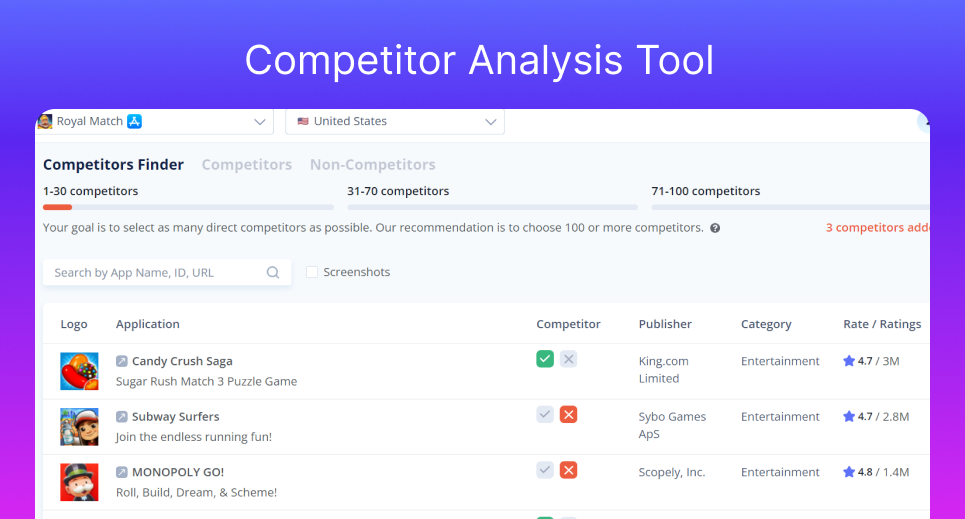
To identify the best approach, use the Competitor analysis tool in Asolytics
7 Tips for Creating a Solid Mobile Game Marketing Strategy
A mobile game marketing plan is a strategic document that delineates your game’s promotional objectives, mobile app target audience, key messages, and the tactics you’ll employ to achieve your goals. Think of it as the lighthouse directing your game to the much-sought-after harbor of popularity, downloads, and revenue. Follow these 7 vital tips if you want to create a solid marketing mobile game plan.
- Establish clear and measurable goals
Begin with a crystal-clear understanding of what you aim to achieve. Whether it’s increasing downloads, boosting in-app purchases, or enhancing player engagement, your objectives should be specific, measurable, and achievable. - Gain insight into your audience
Identify your target audience’s demographics, preferences, and behavior patterns. Tailor your marketing efforts to resonate with their desires and gaming habits. - Define your unique value proposition
What makes your game stand out in the crowded app store? Highlight its distinctive features, story, or gameplay that sets it apart from the competition. - Decide on marketing channels
Determine which marketing channels will best reach your specific audience. Social media, influencer collaborations, App Store Optimization, and email marketing are just a few options at your regular disposal. - Make thoughtful financial choices
In other words, spend money wisely. We know that the average cost of creating a gaming app ranges from $20,000 to $200,000. But what about its promotion? How much you’ll have to spend depends on an array of factors, but you should be aware of how to cut down on your expenses without compromising on the outcome. An important recommendation here is: consider paid advertising, but don’t overlook the potential of organic growth through community engagement and word-of-mouth. - Develop a content plan
Plan your marketing activities over time. Regular updates, events, and campaigns keep your mobile game in the spotlight and players engaged. - Monitor, analyze, and refine your mobile games marketing strategy
Continuously track the performance of your marketing efforts. Assess data, gather feedback, and be ready to adjust your strategy in a flash if needed.
Mobile Gaming Market Trends: Digging Deeper
In today’s world of modern mobile gaming, a mosaic of trends, behavior patterns, and tastes takes shape. Gamers today span generations, from tech-savvy kiddos clutching their first smartphones to adults in pursuit of a delightful escape from the daily grind. Mobile game industry trends ebb and flow like ocean tides, but one fact remains crystal: understanding those trends forms the foundation of your path to marketing success. With that said, here are some of the hottest mobile gaming trends of today:
- Cloud gaming
As 5G networks become more common, cloud gaming is speedily becoming a big thing. This means people can now play fancy games on their phones without needing expensive gadgets. As a result, it makes gaming easier and cheaper for wider audiences. - Augmented Reality (AR) and Virtual Reality (VR) games
You might have heard of games like Pokemon Go that utilize AR and VR. Well, this kind of gaming is going to keep getting more popular. As technology gets better, we’ll have even cooler games that mix the real world with virtual fun. - Hyper casual games
Some games are super simple and fast to play, and they’ve become really popular. This trend is going to stick around, and game creators will probably make games that are even easier and more fun to keep players entertained. - Multiplayer games
Multiplayer games, where you can play with friends, have always been a hit. But with social media and mobile gaming on the rise, it’s become super easy for players to team up and enjoy games together. - Subscription models
You know how some mobile games want you to pay a little money every month to get special things throughout the gameplay? Well, this is happening more and more, and more game creators will likely start doing it to make some cash. - Cross-platform gaming
Cross-platform gaming means you can play games on different gadgets like your phone, computer, or game console, all with one account. This makes it easier for players and lets game makers reach wider audiences.
To sum up, if you’re aiming at long-term success, knowing what’s currently hot in your niche is paramount prior to developing your mobile game unique marketing strategy.
Mobile Game Promotion: Exploring Insights of 2025
Now that we’ve covered mobile gaming trends let’s discuss what’s happening on the mobile game promotion scene these days. Here are the key takeaways from the 2024 Global Mobile Game Marketing Trends Insights report released by SocialPeta.
- Explosive Growth. The mobile gaming market is experiencing rapid expansion, driven by a diverse user base from different demographics and regions. As a matter of fact, mobile games currently earn over 50% of the total money in the global gaming market. Such a mobile-nopoly!
- Intense Competition. With thousands of game developers vying for user attention, competition in the market is fierce, necessitating unique appeal and effective marketing strategies.
- Rise in Advertisers. There has been a significant increase in the number of new advertisers in mobile game marketing, contributing to intense competition.
- Creative Volume. Advertisers are introducing new creatives at a high rate, with over 9.3 million new creatives during the quarter, indicating a trend of continuous innovation.
- Regional Shift. Southeast Asia has surpassed Oceania in the number of active advertisers, making it the third most active region in mobile game marketing.
- Genre Trends. Role-playing, strategy, and action game genres dominate mobile game revenue in Southeast Asia, with action games leading in downloads.
- RPG Gacha Games. Anime-style RPG gacha mobile games are witnessing significant revenue growth, driven by character rotations and popular characters.
MiHoYo’s Success. MiHoYo’s game, Honkai Impact: Star Rail Odyssey, achieved remarkable revenue and download figures, demonstrating the potential of RPG games.
Marketing a New Mobile Game: Research Is Everything
For those venturing into mobile app creation for the first time, we advise utilizing Google Trends. As the world’s leading search engine, Google offers invaluable insights into current global trends. This service can swiftly reveal whether your game holds appeal for a target audience or not.
Next, make sure you plan your media strategy ahead of time. Prior to initiating your mobile game promotion, it’s essential to determine your advertising budget. To accomplish this, consider a few crucial points:
- the number of installations you aim for (or other desired actions, such as in-app purchases);
- the time frames you’ll set for accomplishing your goals;
- the cost per installation (CPI) or desired action (CPA) expenses you’ll calculate.
Compile a list of Key Performance Indicators (KPIs). When evaluating their gaming app’s effectiveness, marketers often assess the following metrics:
- Cost per Install (CPI) — the price for each installation;
- ARPU (Average Revenue Per User) and LTV (Lifetime Value) — the earnings generated by a single user.
- Retention Rate — the percentage of users who come back to the mobile gaming app.
- Churn Rate — the proportion of users who opt not to renew or cancel their subscriptions in a given time frame.
- DAU, WAU, MAU — the average count of unique active users who accessed the app daily/weekly/monthly.
- Conversion Rate — the percentage of users who successfully executed the desired action.
- Session Length — the duration of time spent within the mobile gaming app.
Bonus Tip. Avoid channeling your entire ad budget into a single strategy. Experiment with several advertising options, assess their performance and identify the most effective approach in your unique case.
How to Promote Marketing Mobile Game Plan: 15 Best Practices
Now that you’ve felt the tides of international mobile game marketing trends and know the basics of promoting a new mobile gaming app, it’s time to talk about some of the all-time best tactics and ideas you can use to market your game. We’ve already briefly touched upon some of those tactics when discussing organic and paid mobile game marketing strategies. It’s now time to put a laser-like focus on the best of them and explain how to implement them.
- Start simple: promote within your close-knit circle
If you want to kickstart interest in your mobile game or app quickly and effortlessly, start by engaging those in your immediate network.
Do you have friends or family members who might find your mobile game enjoyable? If the answer is yes, don’t hesitate to share it with them! They’re already a part of your close-knit circle and would gladly support your app.
Imagine the power of your connections. Your friends and family each know at least 10 people. Those 10 people know 10 more people. Make these folks your early supporters. They’ll share the news and create the base of your users. - Drive organic installs with ASO
Getting real people to install your app without spending a lot of money is crucial for making your mobile game successful. Organic growth means you keep getting new users without needing a big budget. The primary way of acquiring users organically is ASO.
Making your app easy to find and interesting to your audience is what ASO checklist is all about. It mostly refers to using the right keywords, working on quality ASO localization, getting a high position in app store rankings, creating eye-catching store listings, and gathering positive ratings and reviews. ASO’s ultimate goal is to make your app easily discoverable and attractive to your target audience. - Run Apple Search Ads
To further market your mobile game and boost its growth, combine ASO with app store ads. The main places to run ads in app stores are Apple Search Ads and Google App Campaigns. With both of these channels, you can set up campaigns to get more interested people to install and play your game.
Here’s a comprehensive guide with tips and instructions on how to make the most of Apple Search Ads:
- Apple Search Ads operate based on keywords. That said, identify relevant keywords related to your game’s genre, gameplay, and features.
- Set competitive bids for your chosen keywords to ensure your ad appears prominently.
- Craft compelling ad copy and visuals that highlight your game’s unique selling points.
- Utilize Apple’s targeting options like demographics, location, and device type to reach your ideal audience.
- Allocate your budget wisely, and monitor spending to maximize ROI (Return on Investment).
- Organize your campaigns into ad groups based on keyword themes for better control.
- Continuously test ad variations to optimize performance and refine your strategy.
- Implement tracking to measure downloads, in-app actions, and ROI.
- Monitor campaign performance, adjust bids, and refine ad creatives to improve results.
- Keep an eye on your competitors’ strategies and adapt accordingly.
Utilizing Apple Search Ads proves highly efficient in attracting more app users and boosting your earnings. These ads boast an impressive average conversion rate of over 60%. The crucial factor here is making smart keyword choices.
- Launch Google App Campaigns
Launching Google App Campaigns with a well-thought-out plan and continuous optimization can significantly boost your game’s visibility, attract engaged players, and drive downloads, ultimately contributing to its success.
Here’s a concise guide with useful tips and instructions:
- Clearly define your campaign goals, whether it’s increasing downloads, in-app purchases, or user engagement.
- Create compelling ad creatives that highlight your game’s unique features and visual appeal. Use eye-catching graphics and concise, persuasive ad creatives.
- Utilize Google’s targeting options to reach the right audience based on demographics, interests, and user behavior.
- Set a reasonable budget and allocate it wisely across different campaign types and networks.
- Choose relevant keywords that reflect your game’s genre, gameplay, and key selling points.
- Utilize various ad formats, such as text, image, and video, to maximize ad reach and effectiveness.
- Consistently experiment with various ad variations to determine what connects most effectively with your target audience.
- Implement conversion tracking to evaluate the success of your campaigns and make data-backed modifications.
- Keep a close eye on your campaign’s performance and adjust your strategy as needed to achieve your goals.
- Boost your mobile game brand recognition using social media
A well-rounded promotional campaign should always include a social media component. While not suitable for every mobile gaming app, social media is a potent tool for many. When it comes to marketing your mobile game, there are two effective paths to explore on social media: organic and paid.
Organic promotion via social media involves:
- Content Strategy. Develop engaging, shareable content like gameplay videos, character profiles, and behind-the-scenes glimpses to connect with your audience.
- Consistent Posting. Post on a regular basis to keep your audience engaged and informed.
- Hashtags. Utilize relevant hashtags to increase discoverability and reach a broader audience.
- Community Engagement. Engage with your followers through comment responses, nurturing a sense of community.
- Influencer Collaboration. Partner with gaming influencers to reach their dedicated fan base and gain credibility.
- User-Generated Content. Inspire players to share their game experiences and game-related content.
- Contests and Challenges. Organize interactive events to boost engagement and virality.
As for paid social media marketing, it suggests:
- Targeted Advertising. Use precise targeting options to reach users who match your game’s demographics.
- Ad Creatives. Design eye-catching ad visuals and copy that convey your game’s unique features.
- Budget Allocation. Set a clear budget and monitor spending to optimize your return on investment.
- A/B Testing. Experiment with an array of ad versions to pinpoint what works best within your target audience.
- Retargeting. Re-engage users who have shown interest in your game but haven’t converted.
- Ad Platforms. Utilize various social media advertising platforms like Facebook, Instagram, Twitter, and TikTok for comprehensive coverage.
At the end of the day, by combining organic and paid social media strategies, you can effectively boost brand recognition for your mobile game, attract a wider audience, and foster a strong community of players.
- Grow your audience with influencer marketing
Another powerful way to market your mobile game and attract more players is influencer marketing. This strategy involves collaborating with influential figures to boost brand visibility and revenue among their dedicated followers.
Follow these steps for successful influencer marketing:
- Research and collaborate with influencers whose audience aligns with your game’s target demographic.
- Cultivate authentic relationships with influencers by engaging with their content and understanding their preferences.
- Consider working with micro-influencers who have smaller but highly engaged followings for a more cost-effective approach.
- Work closely with influencers to create engaging and genuine content that showcases your game’s features.
- Implement tracking links and analytics to measure the impact of influencer campaigns.
- Decide on compensation, whether it’s monetary, product-based, or a combination, based on the influencer’s reach and engagement.
- Monitor your campaign performance on an ongoing basis and change strategies for maximized results.
Keep in mind that mere follower quantity doesn’t guarantee influence or engagement. Thoroughly evaluate an influencer’s profile, content quality, and persona to make an informed choice.
- Implement a referral system for your current game players
Creating a referral program within your app is an effective in-game mobile marketing strategy. Word-of-mouth marketing excels in promoting your mobile game primarily due to its foundation on trust. Follow these tips to succeed in creating an in-game referral system:
- Offer appealing rewards to both the referrer and the referee, such as in-game currency, exclusive items, or premium content.
- Create a seamless and intuitive referral process within your game, making it easy for players to refer friends.
- Encourage players to share referral codes or links through in-game prompts, social media integration, or email invitations.
- Implement a tracking system to monitor successful referrals and ensure timely rewards.
- Showcase the benefits of referrals by highlighting successful cases or displaying leaderboards of top referrers.
- Send personalized referral invitations to your current player base, reaping the perks of their loyalty.
- Continuously analyze the performance of your referral program and make adjustments to improve results.
- Incorporate email marketing into your app release and announcement strategy
Email stands out as a potent instrument to effectively market your mobile gaming app. It empowers you to execute an array of strategies, encompassing product release alerts, pre-order notifications, feature disclosures, event invitations, and more. By creating a list of interested users and sending them specific messages about your mobile game, you can increase the number of people who download it.
Below, we’ve rounded up some expert tips to succeed in marketing your mobile gaming app via email:
- Attract. Reel ’em in with irresistible subject lines that make them want to open your email, just like a gamer chasing a high score.
- Personalize. Address your players by their first names. It’s like getting a power-up in the game — it makes them feel special.
- Announce. Show off your game’s latest features and improvements. It’s like revealing a secret level that only your email subscribers get access to.
- Reward. Offer exclusive in-game rewards or sneak peeks to your email subscribers. It’s the VIP treatment for your players.
- Engage. Make your emails fun and exciting, just like your game. Use GIFs, emojis, and colorful visuals to keep their attention.
- Call-to-Act. Use buttons that scream ‘Play Now’ or ‘Download Here.’ Make it as easy as finding a hidden treasure.
- Stimulate. Ask for player feedback and listen to their suggestions. It’s like having beta testers who are also your biggest fans.
- Balance. Keep the emails coming, but don’t spam. It’s all about finding the right balance, like mastering a tricky game level.
- Mobile-Optimize. Ensure your emails look great on mobile devices. Mobile gamers are a big chunk of your audience.
- Invest resources in promoting your mobile game via YouTube
If your mobile game boasts exceptional mechanics and immersive gameplay, consider dedicating time to promote it via YouTube videos. Videos have the power to demonstrate your game’s gameplay, features, and advantages, making it easier to attract new users. Share these videos on gaming community websites. Don’t forget to conduct thorough market research to identify popular online games. It will open doors to collaboration opportunities, where you can partner with players to promote your game to their dedicated fanbase.
Below, we’ve provided game-changing tips on how to promote your mobile gaming app via YouTube:
- Showcase the most exciting and engaging aspects of your game in the video. Highlight unique features and gameplay mechanics.
- Use concise, descriptive titles and detailed video descriptions, including relevant keywords, to improve discoverability.
- Maintain a consistent visual style and branding across your videos to build recognition.
- Post consistently to keep your audience engaged and coming back for more.
- Encourage viewers to like, comment, and subscribe, fostering a community around your game.
- Partner with popular gaming YouTubers for exposure to their established audiences.
- Encourage players to create and share their gameplay videos, increasing visibility.
- Share your videos on social media, forums, and gaming communities to broaden your reach.
- Monitor video performance and audience engagement to refine your strategy over time.
- Make the most of mobile advertising
Mobile advertising offers an alternative means to market your gaming app. While Google app campaigns and Apple Search Ads should be your primary focus, incorporating mobile ads can help you reach a wider audience and boost your app’s exposure.
Here are some useful tips on how to marketing mobile game through mobile advertising:
- Define your ideal player demographics and interests to ensure your ads reach the right audience.
- Design attention-grabbing ad visuals and ad creatives that highlight your game’s unique features.
- Continuously test different ad variations to identify what your audience loves the most.
- Optimize your app’s store listing, including keywords, visuals, and descriptions, to increase conversions after users click on your ad.
- Create dedicated landing pages that provide more information about your game and encourage downloads.
- Set clear budgets and monitor spending to achieve maximum cost-effectiveness.
- Experiment with various ad formats such as banners, interstitials, and video ads to find the most effective ones for your specific mobile game.
- Use tracking tools to measure user engagement, conversion rates, and ROI to refine your campaigns.
- Explore different mobile ad networks and platforms to find the ones that yield the best results for your game.
- Gather feedback from users who installed your game through ads to make non-stop improvements.
- Practice cross-promotion
Cross-promotion in the context of mobile game marketing involves collaborating with other game developers to mutually promote each other’s products.
Here are some vital tips for successful cross promotion:
- Relevance Is Key. Partner with games that share a similar target audience or thematic elements to ensure relevance. For instance, in indie mobile game marketing, if you’ve developed a retro-inspired platformer with a focus on pixel art and challenging gameplay, seeking collaboration with another indie title that shares these traits can be a strategic move.
- Encourage Engagement. Offer in-game rewards or bonuses to players who install and engage with your game through the promotion.
- Prioritize Strategic Placements. Place promotional materials, such as banners or interstitial ads, strategically within partner games.
- Practice Clear Messaging. Craft concise and compelling ad copy that entices players to click and explore your game.
- Track and Analyze. Use analytics tools to monitor the performance of cross-promotions and make data-driven adjustments.
Engage in Consistent Communication. Maintain a good relationship with your partners and keep communication open for future collaborations.
- Invest in community building
Dedicating time to cultivate a gaming community is a wise move for promoting your mobile game. Communities filled with players who share a love for gaming and enjoy exploring new titles can provide substantial support.
As a starting point, consider forming a social media group designed for sharing exclusive game-related content. Although it requires an investment of time and patience, as your group grows, you can introduce a range of incentives for members and focus on promoting specific elements of your app.
Hosting online events is also highly effective for app promotion. By offering exclusive promotions and rewards to top-performing gamers, you can showcase your app’s capabilities to potential users.
- Benefit from game review websites
Utilizing review websites is a strategic move to effectively market your mobile game. Here’s why you should do it:
- Credibility and Trust. App review websites lend credibility to your game by offering unbiased opinions, which can build trust among potential players.
- Increased Visibility. Reviews can improve your game’s visibility in app stores and search results, leading to more downloads.
- Targeted Audience. Many app review websites cater to niche audiences, allowing you to reach your game’s specific target demographic.
- Networking. Building relationships with reviewers can lead to future coverage and partnerships.
To effectively incorporate using app review websites into your mobile game marketing strategy, follow these tips from our experts:
- Research. Identify reputable review websites relevant to your game’s genre or niche.
- Practice Professional Communication. Reach out to reviewers with a professional and personalized pitch, highlighting your game’s unique selling points.
- Provide Review Materials. Offer press kits, screenshots, and promo codes to make the reviewer’s job easier.
- Respect Reviews. Accept both positive and negative reviews gracefully, and use them to enhance your game.
- Monitor and Engage. Stay engaged with reviewers and their readers in the comments section, responding to inquiries or addressing concerns.
- Bolster marketing effectiveness with automation tools
Did you know that 73% of businesses use automation tools these days? And more will use them as these tools get better. These tools help mobile marketers by doing boring jobs so that marketers can focus on smart thinking. Here are some key tips to reap the perks of automation tools in the context of promoting your mobile gaming app:
- Utilize automation tools to segment your user base based on behaviors, preferences, or demographics. This allows you to send tailored messages to specific groups, increasing engagement.
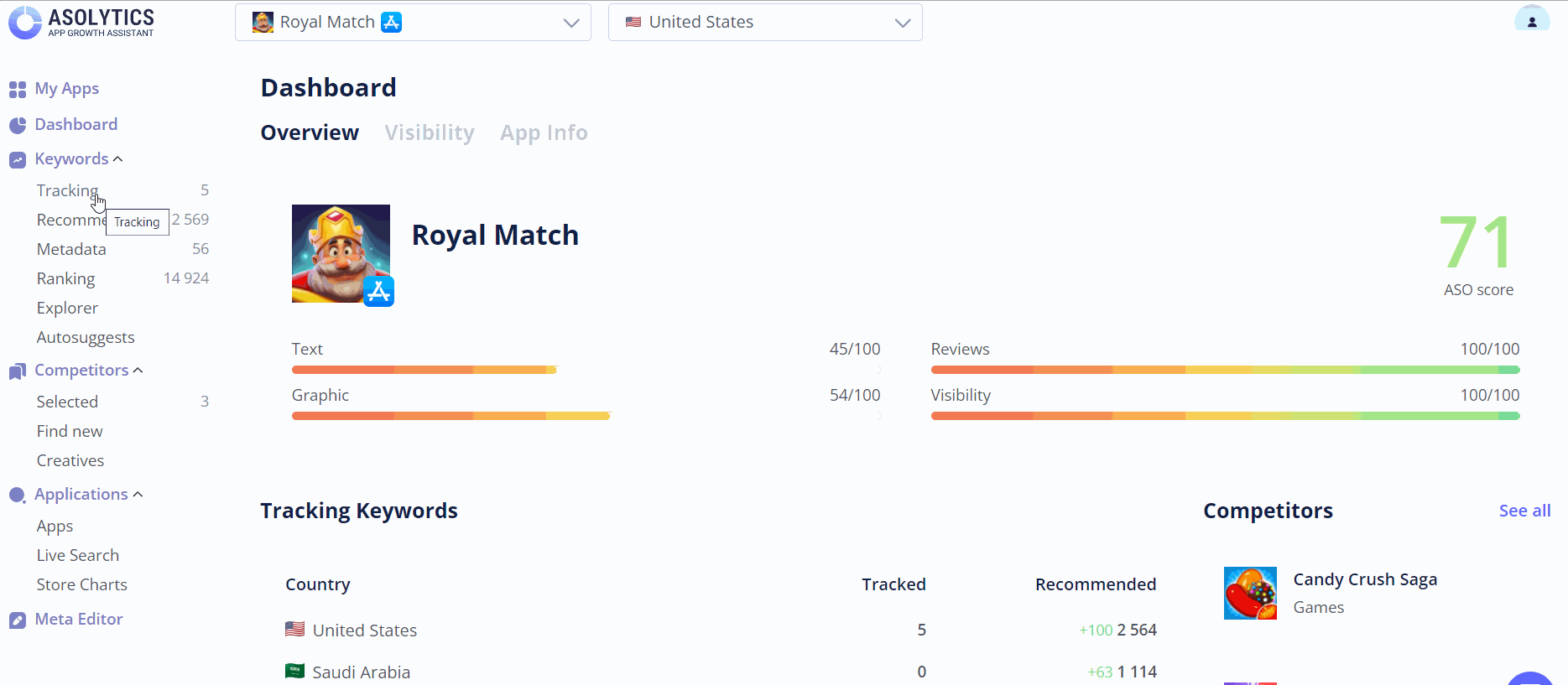
- Set up automated email campaigns to welcome new users, re-engage inactive players, and send personalized game updates. Automation ensures timely communication without manual effort.
- Use automation to trigger in-app messages or notifications based on user actions, such as reaching a certain level or completing a tutorial. This keeps players engaged and informed.
- Automate social media posts to maintain a consistent online presence. Schedule posts for convenient times to reach your target audience.
- Automation tools can collect and analyze user data in real-time. Use this information to refine your marketing strategies, identify trends, and make data-backed decisions.
- Automate your advertising campaigns by setting predefined budgets, schedules, and audience targeting criteria. This ensures efficient ad spend and optimal results.
- Implement chatbots or automated responses for common user queries to provide quick support and take the user experience to a brand new level.
- Use automation to track key performance indicators and receive alerts when metrics deviate from expected levels. This allows for timely adjustments to your marketing approach.
- Automate ASO tasks, such as keyword tracking and competitor analysis, to improve your app’s visibility and rankings. Make the most of the Asolytics keyword tracking tool to significantly speed up your time-consuming and often even exhausting ASO processes.
- Set up automated surveys or feedback forms to gather user opinions and improve your game based on their input.
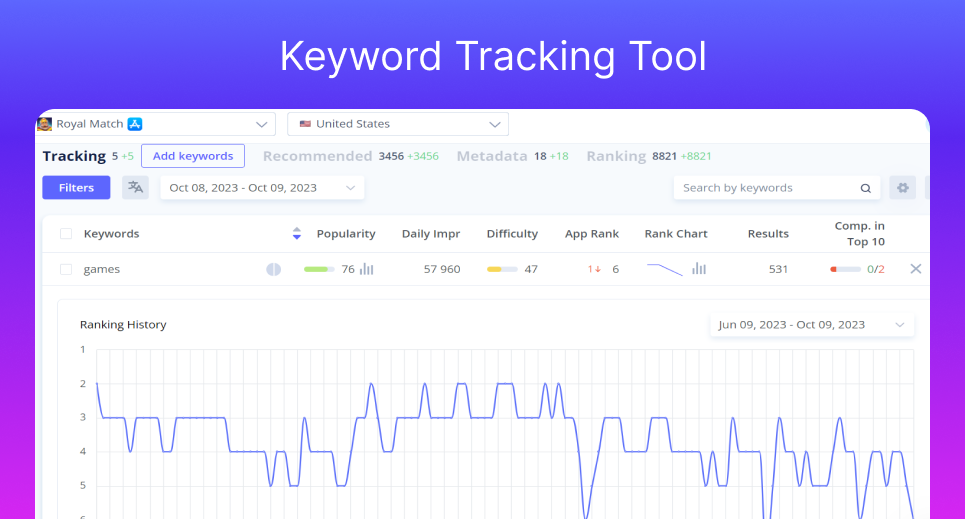
- Incorporate offline practices into your mobile game marketing strategy
Never underestimate the power of traditional marketing techniques and offline tactics when it comes to mobile gaming app promotion. Consider these strategies to boost your app’s visibility and user acquisition:
- Participate in industry trade shows and events relevant to your app’s niche. It allows you to engage with prospective users, put your app in the spotlight, and create a buzz within the industry.
- Consider sponsoring community events like sports tournaments or local groups. Building ties with local potential players not only boosts brand recognition but also fosters positive sentiments within the community.
- Maximize the impact of your app’s promotion by strategically placing billboards and posters in high-traffic areas like bus stops, train stations, and shopping centers. Clearly articulate the value and advantages of using your gaming app to attract potential fans.
- Design informative flyers and distribute them in locations where your target audience typically gathers. If your focus is on students, make sure to target college campuses, coffee shops, and libraries for maximum visibility.
- Boost your mobile gaming app’s presence and foster word-of-mouth promotion by offering free merchandise, such as t-shirts or stickers adorned with your unique branding.
Walt Disney’s wisdom, ‘Do what you do so well that they will want to see it again and bring their friends,’ holds profound meaning in the mobile gaming niche. These days, good enough is simply not enough, both when it comes to creating a stellar game and marketing it. Now that we’ve provided you with an overview of some of the most effective mobile game marketing practices, we find it exceptionally important to emphasize the power of excellence. Use it in your promotional endeavors if you really want to succeed. Going the extra mile to demonstrate that your creation is the undisputed champion is what truly counts. And this is where mobile game marketing takes center stage.
Bottom Line: Mobile Game Promotion Is Hard. But You Can Do It
As we are about to say good-bye to 2025 the mobile game marketing landscape continues to evolve rapidly. It’s no longer sufficient to rely solely on paid advertising or organic strategies. Instead, a balanced approach that combines the strengths of both is paramount. Paid marketing can bring immediate attention and user acquisition, while organic strategies foster long-term outcome and player loyalty.
To excel in this dynamic environment, mobile game marketers must embrace innovation, adapt to emerging technologies, and keep a keen eye on market trends. The integration of augmented reality, virtual reality, and blockchain in mobile gaming is already reshaping the industry and offering exciting opportunities for marketing.
Moreover, understanding your target audience, engaging with your community, and delivering exceptional gameplay experiences remain at the core of success. User-centricity should guide every marketing decision, from app store optimization to content creation and in-game events.
All in all, the mobile game marketing strategy for 2025 is a multifaceted, adaptive journey. It’s about combining the right ingredients of creativity, data-driven insights, and user-centricity to not only attract players but to keep them coming back, sharing with their friends, and eagerly awaiting your next creation. Success in mobile game marketing isn’t just about playing the game. It’s about mastering it, continually leveling up, and inviting others to join the adventure. With the right promotional strategy, dedication, and a dash of innovation, your mobile game can capture the hearts and screens of players worldwide. Keep experimenting. Never stop learning. Never give up. And you are bound to succeed in your mobile game strategy development endeavors.
FAQ
What is mobile game marketing?
Mobile game marketing refers to the strategies and techniques used to promote and advertise mobile games to a target audience, with the aim of acquiring users, increasing visibility, and achieving success in the incredibly competitive mobile gaming industry.
How can I make my mobile games popular?
Focus on creating high-quality games, optimize for app stores, engage with your player community, invest in marketing, use social media, collaborate with influencers, and continuously update and improve your games based on player feedback.
Why is marketing important in mobile gaming?
Marketing in mobile gaming is vital as it promotes games to a vast and diverse audience. Effective marketing attracts users, increases visibility, and drives revenue. In the competitor-packed mobile gaming industry, it’s the key to standing out, acquiring players, and ensuring the success and longevity of a game.
Who is the target audience for mobile gaming?
The target audience for mobile gaming is diverse, encompassing all age groups. It includes teenagers, adults, and seniors from various regions and cultural backgrounds. Tailoring your game and marketing efforts to specific demographics within this broad audience is crucial for a maximized effect.
How to create a successful mobile game marketing plan?
Start with market research and define your target audience. Set clear goals, allocate realistic budgets, and choose the most suitable marketing channels. Develop creative assets, plan campaigns, and track performance. Continuously analyze data, adapt strategies, engage with players, and prioritize player-focused approaches to ensure a successful marketing plan.
Where is the best place to promote a mobile game?
It depends on your target audience and marketing strategy. App stores, social media, YouTube, and gaming forums are popular options. Tailor your approach to reach your ideal players effectively.
Organic or paid mobile game promotion: which is best?
It depends on your goals. Organic promotion builds a loyal user base over time, while paid promotion provides rapid user acquisition. A balanced strategy that combines both can be most effective, making use of the strengths of each to achieve long-term results and short-term growth.
What are the most effective organic mobile game marketing practices?
They include optimizing app store listings (ASO), engaging with player communities, creating compelling content, and utilizing social media. Building a strong player base through word-of-mouth, positive reviews, and continuous game updates is key. Collaboration with influencers and cross-promotion with other games can also boost visibility.
What are the best paid mobile game marketing practices?
They are targeted advertising on platforms like Facebook and Google, using video ads, and collaborating with influencers for endorsement. App store ads, retargeting campaigns, and creative ad design are effective, too. Additionally, optimizing cost-per-acquisition (CPA) and return on ad spend (ROAS) metrics ensures cost-effective promotion.
What are the must-dos of marketing a new mobile game?
Must-do steps in this context include effective ASO, creating engaging gameplay experiences, making the best out of social media and influencer partnerships, running targeted advertising campaigns, fostering user communities, and continuously updating the game to keep players engaged and interested in the long term.
Why use automation tools in mobile game promotion?
Automation tools are valuable in mobile game promotion because they speed up repetitive tasks, saving time and reducing errors. They help you with efficient user segmentation, personalized messaging, and data analysis, enhancing marketing effectiveness. Automation also allows for real-time adjustments, improving campaign performance and helping mobile game marketers make perfectly informed decisions for maximized results.
Are in-game ads effective?
They can be effective when implemented correctly. They reach players during gameplay, offering opportunities for exposure and engagement. However, their success depends on relevance, non-intrusiveness, and alignment with the game’s style. Well-executed in-game ads can boost revenue and user engagement while maintaining a positive player experience.
How much does it cost to promote a mobile game?
The cost of promoting a mobile game varies widely, depending on factors like advertising budget, marketing channels, and campaign complexity. It can range from a few hundred dollars for smaller campaigns to thousands or even millions for large-scale, highly competitive efforts.
What are mobile game marketing trends of 2025?
In 2025, mobile game marketing trends are marked by explosive growth in the global scene, intense competition among a record number of advertisers, and a surge in creative innovation. Southeast Asia has emerged as a highly competitive region for mobile game marketing, particularly in the action game genre


